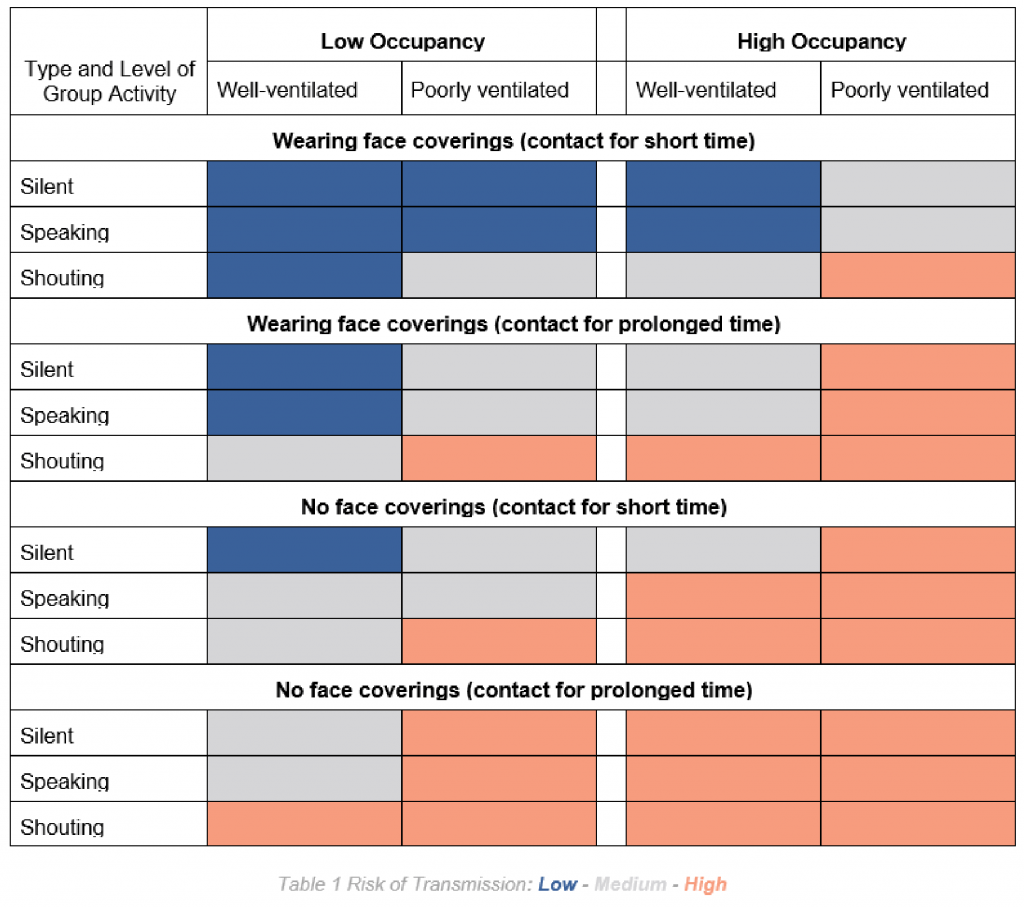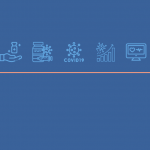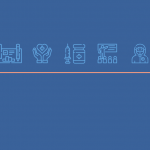Summary
• Pakistan’s battle with the Covid-19 pandemic is far from over. In relation to the low achieved in October 2020, new cases (% of tests conducted) have remained on the higher side for the past 3 months.
• Overcrowded spaces such as domestic transport can be the hub for virus transmission, particularly in the absence of observance of SOPs.
• There is a general fatigue now being experienced and widespread disregard of SOPs can be seen everywhere while implementation mechanisms have also become lackluster.
• Studies indicate that wearing a mask can reduce the likelihood of virus transmission by 65-75%. The government needs to ensure that
passengers and transport providers adhere to the SOPs. The government should focus on improving implementation through strict monitoring mechanisms.
• A challenge for the government will be to find a balance between lives and livelihoods in case the population does not follow SOPs strictly. Strict implementation of SOPs will help the government avoid making hard decisions at a later stage such as imposing lockdowns or a complete domestic travel ban which could have significant adverse economic implications.
• In cases where the government does have to temporarily halt transport services, it can consider targeted financial relief packages.
Identifying the Problem
The second wave of the Covid-19 pandemic started gaining momentum at the end of November 2020 in Pakistan. In the first wave, fatalities were less than widely anticipated. Various measures such as lockdowns, ban on intercity travel, suspension of international and domestic flights and observance of necessary SOPs played a role in containing the spread of the virus. In the second half of March, the provincial governments declared medical emergencies and announced lockdowns, banning inter and intra city travel. Moreover, international and domestic flights were also banned on March 21st and 26th, respectively. Since Covid-19 spreads from person-to-person interactions and human mobility is a big factor in the same, travel restrictions were introduced to prevent the import of infections from high-risk to low-risk areas. By the end of March 2020, public transport was completely halted in Pakistan.
The lockdowns had an adverse impact on daily wage earners and as the conversation shifted from lives to livelihoods, the government gradually started lifting the bans in mid-May and permitted transport operators to resume operations. The transport sector employs more than 3.1 million people [i], who were all impacted by its closure, particularly daily wage earners. Moreover, thousands of Pakistanis rely on inter and intra city transport to commute to work; often belonging to the low-income segments of society.
In relation to the low achieved in October 2020, new cases (% of tests conducted) have remained on the higher side for the past 3 months. Given that the pandemic has plagued lives for over a year now, a fatigue is clearly evident with less than desired implementation of SOPs. Meanwhile, enforcement is also weaker now versus the early days of the pandemic. Intercity transport can be identified as one major channel for the transmission of the virus, particularly in context of weak implementation of containment strategies.
Other governments around the world have also taken various measures to curb the spread of Covid-19. In Turkey, the government is considering imposing a complete intercity ban again as cases from megacities like Istanbul are being exported to other small provinces [ii]. The Turkish government has already imposed travel restrictions on senior citizens travelling on public transport due to their higher vulnerability to infections. Other countries have taken a different approach by imposing curfews and strict restrictions. For instance, in Egypt, public transportation is not operational from 00:00 to 04:00. The French government imposed a curfew from 20:00 to 06:00, and a person can incur a fine of EUR 135 if caught traveling during the curfew hours for non-essential reasons. Italy has also banned intertown and interregion movement for non-essential reasons [iii].
What exacerbates the problem
The initial success of averting a catastrophic situation during the first wave resulted in the relaxation of containment policies where many started ignoring SOPs [iv]. A recent poll by Gallup has shown that 75% of Pakistanis feel that the Covid-19 situation is now under control and there is no need for precautions anymore [v]. This ill-fed confidence has meant that people are no longer observing SOPs and the second wave is claiming many additional lives. The situation at bus stations is worrisome with most people breaching SOPs in the absence of implementation mechanisms. Bus stations are over-crowded, social distance is not maintained in ticketing queues, and masks are not worn by many. The situation is similar inside vehicles carrying passengers. As shown in the table below, the risk of transmission can be high in a highly occupied closed space with poor ventilation.

Given the ongoing winters in most parts of the country, ensuring ventilation inside vehicles is also a challenge. Failure by both government authorities and bus operators to implement and ensure SOPs has led to negligence by the public. The situation is similar in luxury transport services. During the first wave, the government adopted strict measures against those who violated SOPs. For instance, the DRTA of Punjab impounded 38 vehicles and imposed hefty fines for SOPs violations in July 2020 when the number of new cases daily were peaking [vii]. In Khyber Pakhtunkhwa, the provincial government recently sealed 20 bus stands and imposed a fine of Rs7.5 million on 32,219 vehicles.
Tensions between government bodies and transport operators have also exacerbated the issue. The Punjab government struggled in negotiations on SOPs with the All Pakistan Transport Owners Federation (APTOF). Members of APTOF argued that SOPs requiring them to function at 50% capacity while also requiring fares to be reduced, were not fair and would result in a loss to the bus operators. They posited that services would only be resumed once their concerns are addressed [viii].
Tourism is becoming an important part of Pakistan’s economy especially for the KP province and the northern areas. In 2018, the KP province recorded 5 million tourists in four of its most popular destinations. Around 8,665 jobs in these areas are supported by tourism as it contributes USD5 million to the local economy [ix]. However, these tourist destinations are also at the risk of becoming hot spots for the virus. Late last year, hotels in Shogran, Naran and Kaghan were sealed when new coronavirus cases were reported following a surge in tourist activity. In the Hazara division, a total of 372 cases were reported in just 12 days after tourists were allowed to visit [x]. This is especially worrisome given the lack of access to healthcare facilities in such areas.
Given that intercity transport sector in Pakistan is mostly informal, experts have emphasized that it makes it difficult to enforce the implementation of SOPs [xi]. If the sector was formalized, an easy top-to-bottom approach could have been taken, which would make it easier to monitor compliance, and impose penalties on those who fail to comply. Examples of formal bus service, even though they are just a fraction of the total such service providers in Pakistan, are Daewoo or Bilal Travels. In a case where violation of SOPs is observed in their buses, a financial penalty can be imposed directly on the company, which in result will push them to ensure that SOPs are being followed to avoid such penalties in the future.
Implications
With the changing perception of the coronavirus among the Pakistani population, the reality is that the virus is still spreading in Pakistan. A new variant of the Covid-19 has also made its way to Pakistan, which is said to be 56% more contagious, meaning that it has increased transmissibility. To put this in context, the UK on December 29 recorded its highest number of new infections in one day with more than 53,000 cases [xii].
Enforcement of containment measures is absolutely critical at this point. Wearing a mask can reduce the likelihood of spread by 65-75% [xiii]. With Karachi reporting around 95% of asymptomatic cases, which makes it harder to identify infected persons, it is vital that masks are made mandatory in closed spaces like buses [xiv]. Also, non-pharmaceutical interventions such as travel restrictions can have a major impact according to a study that shows that infection rates have a 67-fold increase without any restrictions or interventions in place [xv].
However, banning public and private transport from a district or a city can have economic implications. For instance, previously 2,800 transport workers were left unemployed only in Faisalabad as a consequence of a travel ban. Moreover, people also rely on public transport facilities to travel for work from district-to-district. Data from 2015 shows that around 700,000 people travelled to and from Karachi every day. While recent data is not available, it can be assumed that these numbers would have increased exponentially over the last 5 years given the increase in population and improved road infrastructure [xvi]. The same can be applied to other provinces where people living in towns around metropolises like Lahore, Peshawar, Rawalpindi, Multan and Quetta travel to the megacities every day for work. Therefore, any district brought under travel restrictions will have an economic impact on people in the area especially those who rely on intercity travel to earn daily wages.
Given the informal nature of the transport sector, a temporary ban or termination of services can lead to several workers being unemployed without any financial relief provided by the employer. The government does not have any special relief package that targets the transport sector in Pakistan. In comparison, a report from Asian Development Bank shows
that several countries have introduced a stimulus package for the transport sector that specifically provides financial assistance to employers and employees affected by the pandemic [xvii].
With the vaccine on its way, it is vital to ensure that the government focuses its efforts towards containment of the virus as best as it can so that healthcare facilities are not overburdened with active cases of the virus while also administering vaccines to the population. The government must focus on preemptive policies as opposed to reactionary policies once the situation worsens and goes beyond control [xviii].
Recommendations
1
Strengthening Existing Infrastructure for Implementatio of SOPs
The federal and provincial governments have already identified SOPs for the transport sector. The problem lies in the lack of implementation. The NCOC has also identified it as a significant issue in ensuring containment of the virus. Moreover, initial negligence and failure in implementation may create conditions that necessitate authorities to adopt harsher policies. Implementation can be ensured by mandating authorities such as the police to impose fines on transport providers violating SOPs. For intercity travel, police checkpoints can be used as monitoring stations to inspect whether the passengers are adhering to the SOPs or not.
2
Restricting Travel from High-risk Areas
The government has collected data that helps identify regions and districts that are hot spots of Covid-19. By looking at the percentage of positive cases in relation to tests conducted and the size of population, provincial and district level governments can take localized and targeted decisions to ban public and private transport to and from high risk areas. This will be essential in containing the virus from spreading into other parts of the country
3
Creating Awareness and Community Engagement
The government needs to apply renewed focus on creating awareness regarding SOPs to manage the spread of infection during the second wave. The Ministry of Information and Broadcasting can take the lead in this initiative. By running a 20-30 second awareness campaign every hour on radio and leading tv networks, a narrative can be created where the emphasis is placed on wearing a mask and maintaining distance in public, especially when travelling. At the same time, engaging with local community leaders such as teachers, doctors, traditional healers, religious and spiritual leaders, can help spread awareness in remote/rural areas.
4
Providing Financial Support/Relief Package
The government may consider a relief package for workers in the transport industry when services are halted due to containment measures. Financial assistance should especially be made available to those relying on daily wages. This financial assistance package can be initiated under the Ehsaas programme.
This material has been developed by Tabadlab in partnership with DRI. It has been funded by UK aid from the UK government; however, the views expressed do not necessarily reflect the UK government’s official policies.
End Notes
[i] AASA Consulting. (2018). Bankability of the Transport Sector in Pakistan. Karandaaz Pakistan.
Retrieved from Karandaaz: https://karandaaz.com.pk/wp-content/uploads/2018/11/Bankability-of-the-TransportSector-2-1.pdf
[ii] Arab News. (2020, December 8). Turkey considers intercity travel restrictions to curb COVID-19 spread
Retrieved from Arab News: https://www.arabnews.com/node/1774136/middle-east
[iii] Intelyse. (2020). Travel Restrictions and National COVID-19 Control Measures.
Retrieved from Intelyse: https://intelyse.com/coronavirus-travel-restrictions/
[iv] Junaidi, I. (2020, June 15). Relaxing lockdown, SOPs’ violation led to increase in Covid-19 cases: Punjab health official.
Retrieved from DAWN: https://www.dawn.com/news/1563625
[v] Gallup Pakistan. (2020). Coronavirus Attitude Tracker Survey Pakistan: Wave 8 Results. Islamabad: Gallup.
[vi] Jones Nicholas R et al. (2020). Two metres or one: what is the evidence for physical distancing in covid-19? BMJ; 370:m3223.
Retrieved from BMJ: https://www.bmj.com/content/370/bmj.m3223
[vii] APP (2020, July 4). 38 vehicles impounded, fine imposed over SOPs violation.
Retrieved from The News: https://www.thenews.com.pk/print/681642-38-vehicles-impounded-fine-imposed-over-sops-violation
[viii] Omer, S. (2020, May 18). All transporter bodies except one oppose new SOPs.
Retrieved from Pakistan Today: https://www.pakistantoday.com.pk/2020/05/17/transporters-say-wont-resume-services-reservations-addressed/
[ix] Afzal, K. (2020, April 17). COVID-19 delays activities of Pakistan’s domestic tourism industry.
Retrieved from World Bank Blogs: https://blogs.worldbank.org/endpovertyinsouthasia/covid-19-delays-activities-pakistans-domestic-tourismindustry
[x] Sirajuddin, & Bacha, U. (2020, August 23). All hotels in tourist hotspots Naran, Kaghan and Shogran sealed after staff test positive for Covid-19.
Retrieved from Dawn: https://www.dawn.com/news/1576058
[xi] In consultation with experts from The World Bank.
[xii] Grover, N. (2020, December 29). UK records its highest number of new Covid infections, with 53,135 cases.
Retrieved from The Guardian: https://www.theguardian.com/world/2020/dec/29/uk-records-its-highest-number-of-new-covidinfections-with-53135-cases
[xiii] Chu, D. K. et al. (2020). Physical distancing, face masks, and eye protection to prevent person-to-person transmission of SARS-CoV-2 and COVID-19: a systematic review and meta-analysis. The Lancet. https://www.thelancet.com/journals/lancet/article/PIIS0140-6736(20)31142-9/fulltext & Turak, N. (2020, May 19). Wearing a mask can significantly reduce coronavirus transmission. CNBC. https://www.cnbc.com/2020/05/19/coronavirus-wearing-a-mask-can-reducetransmission-by-75percent-new-study-claims.html
[xiv] Dawn. (2020, September 8). 9 out of 10 Covid-19 patients in Karachi are asymptomatic, AKU study reveals. Retrieved from DAWN: https://www.dawn.com/news/1578577
[xv] Lai, S et al. (2020). Effect of non-pharmaceutical interventions for containing the COVID-19 outbreak in China. Nature, 410-413. https://doi.org/10.1038/s41586-020-2293-x
[xvi] Wesolowski, A., Qureshi, T., Boni, M. F., Sundsø, P. R., Johansson, M. A., Rasheed, S. B., . . . Buckee, C. O. (2015). Impact of human mobility on dengue epidemics. Proceedings of the National Academy of Sciences, 11887-11892.
[xvii] Asian Development Bank. (2020, July 24). Guidance Note on COVID-19 and Transport in Asia and the Pacific.
Retrieved from ADB: https://www.adb.org/sites/default/files/institutional-document/623426/covid-19-transport-asia-pacific.pdf
[xviii] APP (2020, December 28). KP govt seals 20 bus stands over SOPs violation.
Retrieved from The News: https://www.thenews.com.pk/print/765445-kp-govt-seals-20-bus-stands-over-sops-violation
Muhammad Asad Rafi is a Research Analyst for Global Affairs and International Security at Tabadlab. He holds a M.A in International Security from Paris School of International Affairs at Sciences Po. His research interests lie in the fields of regional security, foreign policy and global affairs.






